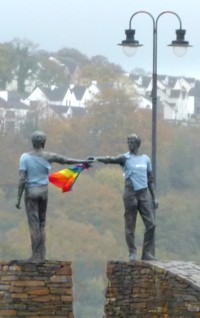Cork
Cork is the second most populous city in the Republic of Ireland, after Dublin. In the 6th century it was the site of a Christian monastery subject to Viking raids but by the 10th century the Vikings had settled, as in Dublin and Waterford. In due course the Normans arrived (see the history above...) and Cork became a Yorkist town during the Wars of the Roses.
Not a lot of the old Norman city remains. Cork was the location of one of the Tudor Protestant 'Plantations' (see the history above...) and a Republican hot spot during the war for Irish Independence between British Troops, supported by Irish 'Auxiliaries' known as Black and Tans, and the IRA (see the history above...). In 1920 an IRA ambush against the Auxiliaries resulted in Cork being set alight and local attempts to put out the fires being prevented. About five acres of dwellings were consumed, together with several significant public buildings including the town hall. Loss of life was minimal but many were left homeless in what was described as a 'reprisal'. Republicans have not forgotten.
We reached Cork in the morning and were immediately ensnarled in a traffic jam. Parking was difficult to find along the river and we soon determined that this is a busy commercial area with little to recommend it to tourists. We would seek out the local museums. We were tempted by the Cork City Gaol from which Irish Convicts were transported to Botany Bay (Sydney). But after a quick look on-line decided that our recent visit to Kilmainham Gaol in Dublin was enough Gaol experience for one trip. And so we ended up at the apparently next most popular and bizarrely different Butter Museum. This had the added advantage of nearby parking; another church (Church of Ireland) to look at; and pubs within walking distance for lunch.
As the name suggests The Butter Museum records the Irish butter success story. I was reminded of the Cupnoodles Museum in Yokohama. Yet it turned out to be very interesting. Growing up on the rural outskirts of Sydney I was not completely ignorant of dairying. Yet at the same time in Ireland our local dairy would have seemed like a space station to the average Irish farmer. They were still hand milking and using what in Australia would have been a farm's kitchen separator and a hand churn to make butter. It was both primitive and unhygienic.
Then came the European Economic Community. Ireland has some of the world's best dairying countryside and its farms and infrastructure were consolidated, automated and improved. Modern milking sheds were built; herds and pastures brought into the 20th century. Milk processing factories received bulk milk deliveries by tanker and churned out the yellow stuff. At the same time a series of marketing campaigns promoted a single homogenised, high quality product: Irish Butter. And thus butter joined the advanced guard of the Irish economic miracle - the 'Celtic Tiger'.
The museum is high up on the ridge overlooking the city so we strolled down the hill in search of lunch and with the aid of local advice found an ethnically unsullied (authentic) place. As we had noticed in local pubs previously, the locals, while perfectly fluent in English, speak Irish among themselves. With the general wellbeing and quite high prices this gives a tourist in Ireland a similar experience to visiting Denmark. Together with declining religiosity Ireland seems to be joining Scandinavia.
See the Ireland Album - Click Here...

